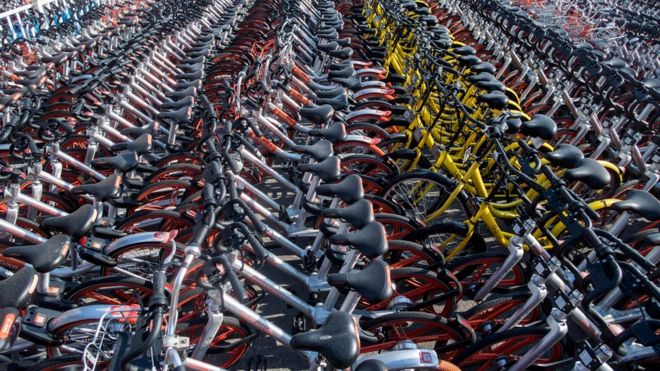It wasn't difficult to see this coming: Beijing has banned all new bike-share bikes.
China's largest city has been bedeviled by the same problems as other municipalities where Ofo, Mobike and other private bike-share companies have set up shop: bicycles are left haphazardly on sidewalks, around people's houses and even in the middle of intersections--or they've been stolen, vandalized or even destroyed.
It seems that the very advantage those share companies offered--their chip-implanted bikes could be located with an app and left anywhere, and didn't have to be taken from or returned to docking stations--also made life easy for vandals, thieves and people who are simply inconsiderate of others.
Beijing is not the first Chinese city to ban new share bikes. Since it is the largest, though, it begs the question of whether similar bike share schemes in the rest of the country are doomed. Moreover, these bans are taking effect just as similar programs are starting in municipalities outside China.
In particular, I wonder about similar operations in the US: Just last month, Ofo began operating in Seattle, as an example. It seems that such private companies appealed to cities like Seattle, where an earlier city-funded bike share program failed, or other American cities that are reluctant to use public funding, or where corporations like Citibank (the sponsor of New York's Citibike) might be reluctant to invest in such a project--or where property or business owners don't want docking stations by their frond doors.
In cities large and small all over the world, there is certainly a demand for bike share programs. Now the problem seems to be one of how to make them useful and practical without creating nuisances or hazards.
China's largest city has been bedeviled by the same problems as other municipalities where Ofo, Mobike and other private bike-share companies have set up shop: bicycles are left haphazardly on sidewalks, around people's houses and even in the middle of intersections--or they've been stolen, vandalized or even destroyed.
It seems that the very advantage those share companies offered--their chip-implanted bikes could be located with an app and left anywhere, and didn't have to be taken from or returned to docking stations--also made life easy for vandals, thieves and people who are simply inconsiderate of others.
 |
Beijing is not the first Chinese city to ban new share bikes. Since it is the largest, though, it begs the question of whether similar bike share schemes in the rest of the country are doomed. Moreover, these bans are taking effect just as similar programs are starting in municipalities outside China.
In particular, I wonder about similar operations in the US: Just last month, Ofo began operating in Seattle, as an example. It seems that such private companies appealed to cities like Seattle, where an earlier city-funded bike share program failed, or other American cities that are reluctant to use public funding, or where corporations like Citibank (the sponsor of New York's Citibike) might be reluctant to invest in such a project--or where property or business owners don't want docking stations by their frond doors.
In cities large and small all over the world, there is certainly a demand for bike share programs. Now the problem seems to be one of how to make them useful and practical without creating nuisances or hazards.



